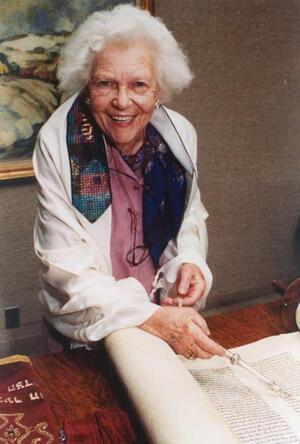Judith Kaplan Celebrates First American Bat Mitzvah Ceremony
"No thunder sounded. No lightening struck," recalled Judith Kaplan Eisenstein of her history-making 1922 Bat Mitzvah ceremony, the first in America. She is pictured here at her second Bat Mitzvah ceremony, where she was honored by a number of prominent Jewish women, including Betty Friedan and Letty Cottin Pogrebin.
Institution: The Ira and Judith Kaplan Eisenstein Reconstructionist Archives, Reconstructionist Rabbinical College
Judith Kaplan, at age twelve, became the first American to celebrate a Bat Mitzvah on March 18, 1922. Judith was the oldest daughter of Rabbi Mordecai Kaplan, the founder of Reconstructionist Judaism. Believing that girls should have the same religious opportunities as their brothers, Rabbi Kaplan arranged for his daughter to read Torah on a Shabbat morning at his synagogue, the Society for the Advancement of Judaism.
The Kaplan Bat Mitzvah marked a turning point for Conservative Judaism in America. Always torn between tradition and modernity, the movement struggled for many decades with women's roles in the synagogue. Judith Kaplan herself did not read from the Torah scroll, as modern Bat Mitzvah celebrants do; instead, she read a passage in Hebrew and English from a printed Chumash (the first five books of the Bible) after the regular Torah service. Still, Rabbi Kaplan's innovation gained followers. By 1948, about a third of Conservative congregations had conducted Bat Mitzvah ceremonies. By the 1960s, Bat Mitzvah was a regular feature of Conservative congregational life; today it is a mainstay in synagogues from Reform to Modern Orthodox.
After her ground-breaking Bat Mitzvah, Kaplan Eisenstein (she married Ira Eisenstein who became Kaplan's successor in leading the Reconstructionist movement) went on to a successful career in Jewish music. After studying at the Institute of Musical Art (now the Julliard School) in New York, she attended the Jewish Theological Seminary (JTS) Teachers Institute and Columbia University's Teachers College, where she earned an MA in music education in 1932. She later earned a PhD in the School of Sacred Music at Hebrew Union College-Jewish Institute of Religion (HUC-JIR).
Kaplan Eisenstein taught music pedagogy and the history of Jewish music at JTS, HUC-JIR, and the Reconstructionist Rabbinical College for many years. She also created the first Jewish songbook for children, Gateway to Jewish Song (1937). Her other published works include Festival Songs (1943) and Heritage of Music: The Music of the Jewish People (1972). In 1987, she created and broadcasted a 13-hour radio series on the history of Jewish music. In 1992, at age 82, Kaplan Eisenstein celebrated a second Bat Mitzvah, surrounded by leaders of the modern Jewish feminist movement. This time, she read from a Torah scroll. Kaplan Eisenstein died on February 14, 1996.
Sources: Jewish Women in America: An Historical Encyclopedia, pp. 126-128, 370-371; New York Times, March 19, 1992, February 15, 1996.




In going through some old family records I found a reference to Mordecai Kaplan. My grandmother's maiden name being Kaplan, I am most curious to know if Mordecai was related as our family tree is incomplete. If someone could point me to a reliable source for research, it would be most appreciated.
I am a freelance writer who would like to research the archives of Judith Kaplan Eisenstein for the purpose of writing an article about her and perhaps eventually a book. I'm also a Juilliard graduate, a retired strings teacher who would be interested in Judith's Judaical music education and her teaching career. I would appreciate your help in gaining access to research materials
Thank you,
Lori Goldstein
I was privileged to take a course with Judith Kaplan Eisenstein at the 92nd Street Y in NYC. and thought of her throughout my 20 years of teaching music in the Reform and Reconstructionist Temples. Every month she and Rabbi Eisenstein met with those of us who taught at the Roslyn, L.I. Reconstructionist Synagogue for pedagogic sessions. Between the two of them we amassed a wealth of knowledge that still remains with me today.
Imagine my delight at finding my mother's cousin Judith Kaplan Eisenstein as one of the subjects for "This Week in History"! I was at the "second Bat Mitzvah" ceremony (with my sister Susan), and remember both her reading from Torah, and, an even more delightful memory, her dancing like a young girl with her beloved husband Ira Eisenstein. Wonderful memories. Do other readers of this entry in TWIH have memories of that evening?
In reply to <p>Imagine my delight at by plsteiner
Prudence is that you? I am fortunate to be a member of Adat Shalom where Judith and Ira davened in their last years to be close to their daughter Miriam. Mim is still a member and a fantastic teacher. She will be performing her mother's cantata at a retreat this May. Best wishes!
In reply to <p>Prudence is that you? I by Susan Kimmel
JWA has forwarded your message. We hope that she will respond to you directly. We are always happy to bring people together.